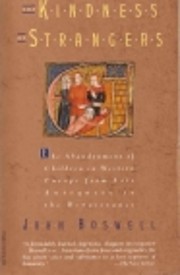

Fai clic su di un'immagine per andare a Google Ricerca Libri.
|
Sto caricando le informazioni... The kindness of strangers : the abandonment of children in Western Europe from late antiquity to the Renaissance (edizione 1998)di John Boswell
Informazioni sull'operaThe Kindness of Strangers, the Abandonment of Children in Western Europe from Late Antiquity to the Renaissance di John Boswell (Author)
 Nessuno Sto caricando le informazioni...
Iscriviti per consentire a LibraryThing di scoprire se ti piacerà questo libro. Attualmente non vi sono conversazioni su questo libro. John Boswell writes "From Roman times to the late Middle Ages, children were abandoned throughout Europe...in great numbers, by parents of every social standing, in a great variety of circumstances." If this passage evokes images of suffering, despair and death, Boswell postulates that from the standpoint of the family and social contexts (if not from the standpoint of children from their social niche and limiting their chances of marriage and reproduction, it curtailed the number of heirs without actually eliminating OH, really?] the children." Abandonment allowed parents " to correct for gender, shift unwanted children to situations where they were desired or valued.." The practice was widespread. Rousseau bragged of throwing his five children to foundling homes. ( “Rousseau wrote that he persuaded Thérèse to give each of the newborns up to a foundling hospital, for the sake of her "honor")* Children were regarded as property' in Roman times and the father had absolute authority. Christian parents, too, abandoned children, although many were concerned lest the fathers later risk incest upon meeting their daughters unknowingly in the local brothel! Boswell suggested the church unwittingly encouraged abandonment by its emphasis on procreative sexuality and its opposition to abortion and infanticide. It seems to me that abandonment should be viewed less as demographic and cultural relief mechanism, than as a social disaster. By the early 15th century when evidence becomes more substantial we learn rates of mortality in and out of orphanages were very high. Certainly the religious institutions of the times must bear a large share of the blame for not encouraging a sense of individual responsibility. They supported profligate procreation rather than careful recreation. There is a lesson in that which we as a society have yet to learn. Full disclosure: I've 'officially', (if you will), removed myself from the history club's mailing list, so to speak, although I am still slowly-- and carefully!-- working my way through my backlog of mail, so to speak.... Anyway, my opinion, at any rate, is, that this book is written.... as adequate as adequate can be. Albeit in a Tony Tanner kind of way. ;) (8/10) nessuna recensione | aggiungi una recensione
Biff, Chip and Kipper Stories: Decode and Develop are exciting new titles in the Oxford Reading Tree series. The stories continue to provide storylines full of humour and drama, with familiar settings and characters. They also support children's transition from fully decodable readers, such as Floppy's Phonics, to a richer, wider reading experience with high-interest vocabulary. The new-style inside cover notes provide advice to help adults read and explore the story with the child, supporting their decoding and language comprehension development. Each pack of 6 includes a Group/Guided Reading Notes Booklet with a Vocabulary Chart listing high frequency tricky words and a Curriculum Coverage Chart for England, Scotland, Northern Ireland and Wales. Each story has individual notes and suggested activities for Group and Independent Reading, Speaking, listening and drama and Writing, with each section showing the relevant objectives covered. Decoding and Language Comprehension opportunities are highlighted throughout. Non sono state trovate descrizioni di biblioteche |
Discussioni correntiNessunoCopertine popolari
 Google Books — Sto caricando le informazioni... Google Books — Sto caricando le informazioni...GeneriSistema Decimale Melvil (DDC)362.7Social sciences Social problems and services; associations Social problems of & services to groups of people Child welfareClassificazione LCVotoMedia: (4.18) (4.18)
Sei tu?Diventa un autore di LibraryThing. |
||||||||||||||||||||||||||||||||||||||||||||||||||||||||||||||||||||||||||||||||||||||||||||||||||||||||||||||||||||||||||||||||||||||
Boswell lays out his arguments, interpretations, and sources with meticulous detail and a wonderfully dry, sarcastic style. See my status updates for statistics or anecdotes that particularly struck me. (